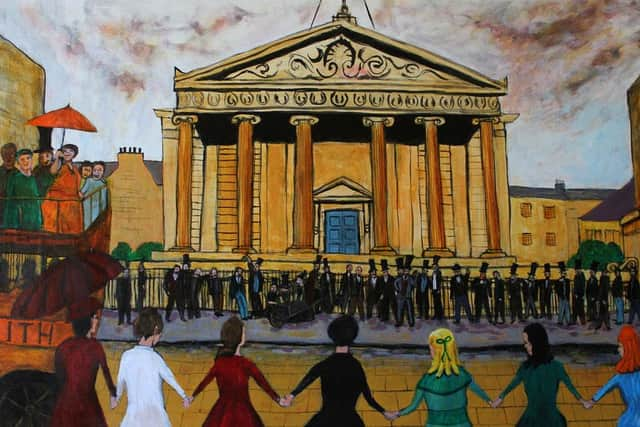Hateful Surgeons' Hall riots that opposed women doctors recalled 150 years on
It is practically taken for granted in the Western World today that no student be discriminated against and certainly not on the grounds of gender – but that was far from being the majority held view 150 years ago.
Riotous scenes erupted in Edinburgh on November 18, 1870 when a large and hostile crowd of men mobilised to prevent seven young women from taking an anatomy exam at the city’s Surgeons’ Hall.
Advertisement
Hide AdAdvertisement
Hide AdDesperate to put a halt to this historic exam, the vicious mob verbally abused, jostled and caked the women, who history would dub the “Edinburgh Seven”, in mud.
The deplorable group, many of them fellow students of the women, slammed the Surgeons’ Hall gates shut in their faces and even went as far as releasing a live animal into the examination room once it was in progress.
Comprised of Isabel Thorne, Edith Pechey, Matilda Chaplin, Helen Evans, Mary Anderson, Emily Bovell and the Englishwoman recognised as their leader, Sophia Jex-Blake, the Seven made history in 1869 by becoming the first women to be admitted on a degree programme at a British university.
However, the groundbreaking setpet endured a year of torment. They learned to cope with people hollering insults at them in the streets, and were forced to attend separate lectures from their male peers.


The Seven were even denied permission to “walk the wards” of Edinburgh’s Royal Infirmary, due to patronising fears the ladies were of too delicate a disposition to cope with the often gruesome sights they might encounter within the hospital.
Recording her approach to the Surgeons’ Hall on the day of the riots, Ms Jex-Blake wrote: "We found a dense mob filling up the roadway in front of us comprising some dozen or so of the lowest class of our fellow students at Surgeons' Hall, with many more of the same class from the University, a certain number of street rowdies and some hundreds of gaping spectators.
"Not a single policeman was visible. The gates were slammed in our faces by a number of young men who stood within, smoking and passing about bottles of whisky while they abused us in the foulest possible language."
Aided by janitors and sympathetic peers, the Seven were able to gain safe passage to the exam hall. However, upon sitting down to take the exam, the mud-covered students were at once disrupted when a live animal, the pet sheep of the Royal College, was released into the room.
Advertisement
Hide AdAdvertisement
Hide AdThe women were helpfully escorted home afterwards by a group of sympathetic Irish students. The mud-slinging and jostling recommenced, however.
Despite growing support for the Edinburgh Seven, a court ruling was passed in the aftermath of the riots which prevented women from studying at the University. The Seven were denied a graduation ceremony.
However, their efforts were not in vain. The riots brought great shame and received widespread news coverage that would lead to a softening in public opinion regarding the inclusion of women in higher education.
To right a very obvious wrong, a plaque was erected in 2015 and the Edinburgh Seven honoured with posthumous honorary degrees last year.
Chris Henry, Museum Director at The Royal College of Surgeons of Edinburgh, said: “For us the riots mark the beginning of the end of an outmoded mode of thinking even though women didn’t formally enter into medical until the twentieth century.
"For the Royal College of Surgeons of Edinburgh, the positioning of the plaque recognises the prejudice that early pioneers had to undergo and highlights the fact that modern medicine women now play a fundamental role in delivering healthcare at all levels.”
Professor Moira Whyte, Head of the College of Medicine and Veterinary Medicine at the University of Edinburgh, said: "The Surgeons’ Hall Riot was a key moment in the movement for women to study in higher education, and led to a surge in support for the Edinburgh Seven.
"We are delighted that these women have now been awarded posthumous degrees and are recognised for their campaign for equality. The legacy of the Edinburgh Seven and their fight for fairness will always be remembered as we continue to push for wider access to university."
A message from the Editor:
Thank you for reading this article. We're more reliant on your support than ever as the shift in consumer habits brought about by coronavirus impacts our advertisers.
If you haven't already, please consider supporting our trusted, fact-checked journalism by taking out a digital subscription at https://www.scotsman.com/subscriptions.
Comments
Want to join the conversation? Please or to comment on this article.